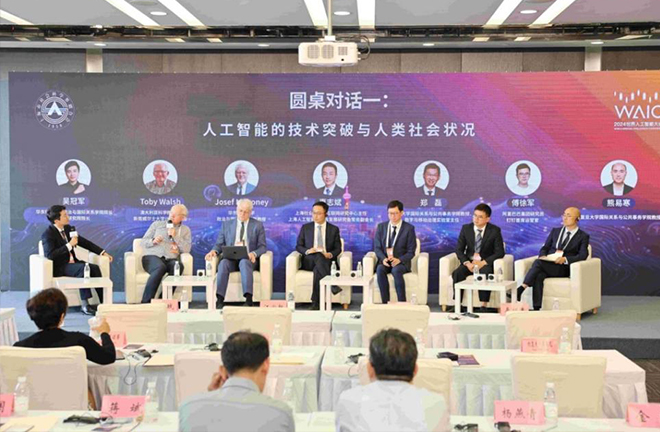Seminar explores good governance of AI

The Forum on New Advances in Artificial Intelligence and the Future of Social Sciences in Shanghai Photo: Zha Jianguo/CSST
SHANGHAI—On July 5, the Forum on New Advances in Artificial Intelligence and the Future of Social Sciences in Shanghai gathered experts and scholars from home and abroad to offer insights into the integration of AI and social sciences and to discuss the social impact of scientific and technological progress.
Integrative development
Quan Heng, deputy director of the Publicity Department of the CPC Shanghai Municipal Committee, emphasized that philosophers and social scientists must follow the dynamics of the rapidly developing AI. On the one hand, the deep integration of AI and socio-economic development has transformed the research paradigms of philosophy and social sciences while spawning a host of emerging disciplines and new academic growth points. On the other hand, new social problems introduced by AI in the fields of morality, ethics, law, and security have made AI itself an important research object of philosophy and social sciences.
According to Wang Zhan, chairman of the Shanghai Federation of Social Science Associations (SFSSA), the advancement of science and technology depends on its ethics. He suggested establishing a risk register of science and technology ethics for AI and restricting the fields it can access, thereby laying a solid foundation for advancing new quality productive forces under the new technological conditions of AI.
In the view of Xiong Yihan, a professor from the School of International Relations and Public Affairs at Fudan University, AI is set to become an integral part of modern society’s infrastructure. At present, AI is still regarded as an external force to human society, indicating its nascent stage of development.
AI development has reached a critical juncture, and China should strive to have a greater voice in this development process. Gao Qiqi, director of the Institute of Political Science at East China University of Political Science and Law (ECUPL) and director of the AI and Big Data Index Academy at the ECUPL, said that with the accelerated application of AI across various social sectors, the productivity effect of AI will become increasingly prominent. In this context, philosophy and social sciences should be fully involved. Social scientists serve to provide specific governance and legal safeguards for the development of AI. In addition, they strive to anticipate and mitigate potential risks associated with AI’s future, ensuring its progress along a healthier and more constructive path.
Ways forward
The new social challenges posed by AI have become a hot topic. Jiang Bixin, vice chairman of the Constitution and Law Committee of the 13th National People’s Congress and former vice president of the Supreme People’s Court of the People’s Republic of China, pointed out that today’s global competition in science and technology extends beyond new intelligent infrastructure to include the rule of law, ecology, and systems. He emphasized that the subjects of legal norms should encompass not only designers and manufacturers but also platforms and consumers to complete the full chain of regulation. Jiang advocated for building a legal framework that supports AI development and innovation by addressing governance concepts, content, and methods.
Toby Walsh, a fellow of the Australian Academy of Science and a professor from the University of New South Wales, believes that AI does not outperform humans in all tasks. Humans possess irreplaceable advantages in creative work and in providing emotional value. Walsh suggested exploring the impact of AI on humanity and addressing future challenges with the tool of philosophy and social sciences.
“Governing AI for Good and for All” captures the latest dynamics in the fields of AI development and governance. Xue Lan, a professor at Tsinghua University, called for joint efforts to drive AI governance systems towards becoming an international public good, rather than a tool exclusive to a small circle. From the perspective of AI global governance, challenges are chiefly concentrated in geopolitics, technological pathways, the coordination of governance and technology, institutional construction, as well as supervision and implementation. As such, more efforts are required to enhance coordinated co-governance, expand multi-level and multi-channel bilateral and multilateral dialogues, intensify international cooperation in the field of AI big science, and leverage the role of philosophy and social sciences to address common global challenges.
The forum was hosted by the SFSSA.
Edited by YANG LANLAN

 PRINT
PRINT CLOSE
CLOSE